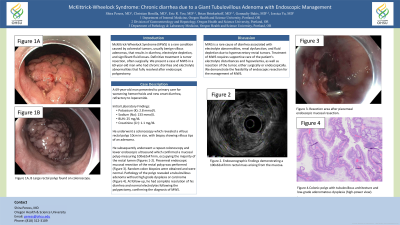Monday Poster Session
Category: Interventional Endoscopy
P2318 - McKittrick-Wheelock Syndrome: Chronic Diarrhea Due to a Giant Tubulovillous Adenoma With Endoscopic Management
Monday, October 23, 2023
10:30 AM - 4:15 PM PT
Location: Exhibit Hall

Has Audio

Shira Peress, MD, BA
Oregon Health & Science University
New Orleans, LA
Presenting Author(s)
Award: Presidential Poster Award
Shira Peress, MD, BA, Christian Bonilla, MD, BS, MS, Eric Yoo, MD, BS, BA, Brian Brinkerhoff, MD, BS, BA, Gennadiy Bakis, MD, Jessica X. Yu, MD, MS
Oregon Health & Science University, Portland, OR
Introduction: McKittrick-Wheelock Syndrome (MWS) is a rare condition caused by colorectal tumors, usually benign villous adenomas, that results in diarrhea, electrolyte depletion, and significant fluid losses. Definitive treatment is tumor resection, often surgically. We present a case of MWS in a 69-year-old man who had chronic diarrhea and electrolyte abnormalities that fully resolved after endoscopic polypectomy.
Case Description/Methods: A 69-year-old man presented to primary care for worsening hemorrhoids and new onset diarrhea, refractory to loperamide. He was found to have moderate electrolyte abnormalities with K 2.8 mmol/L, Na 133 mmol/L, BUN 25 mg/dL, and Cr 1.1 mg/dL, requiring repletion. He underwent a colonoscopy which revealed a villous rectal polyp 10cm in size, with biopsy showing villous tips of an adenoma.
He subsequently underwent a colonoscopy and lower endoscopic ultrasound which confirmed a mucosal polyp measuring 100x62x47mm, occupying the majority of the rectal lumen (Figures 1-2). Piecemeal endoscopic mucosal resection of the rectal polyp was performed (Figure 3). Random colon biopsies were obtained and were normal. Pathology of the polyp revealed a tubulovillous adenoma without high grade dysplasia or carcinoma (Figure 4). At follow-up, he had complete resolution of his diarrhea and normal electrolytes following the polypectomy, confirming the diagnosis of MWS.
Discussion: MWS is a rare cause of diarrhea associated with electrolyte abnormalities, renal dysfunction, and fluid depletion due to hypersecretory rectal tumors. Treatment of MWS requires supportive care of the patient's electrolyte disturbances and hypovolemia, as well as resection of the tumor, either surgically or endoscopically. We demonstrate the feasibility of endoscopic resection for the management of MWS.

Disclosures:
Shira Peress, MD, BA, Christian Bonilla, MD, BS, MS, Eric Yoo, MD, BS, BA, Brian Brinkerhoff, MD, BS, BA, Gennadiy Bakis, MD, Jessica X. Yu, MD, MS. P2318 - McKittrick-Wheelock Syndrome: Chronic Diarrhea Due to a Giant Tubulovillous Adenoma With Endoscopic Management, ACG 2023 Annual Scientific Meeting Abstracts. Vancouver, BC, Canada: American College of Gastroenterology.
Shira Peress, MD, BA, Christian Bonilla, MD, BS, MS, Eric Yoo, MD, BS, BA, Brian Brinkerhoff, MD, BS, BA, Gennadiy Bakis, MD, Jessica X. Yu, MD, MS
Oregon Health & Science University, Portland, OR
Introduction: McKittrick-Wheelock Syndrome (MWS) is a rare condition caused by colorectal tumors, usually benign villous adenomas, that results in diarrhea, electrolyte depletion, and significant fluid losses. Definitive treatment is tumor resection, often surgically. We present a case of MWS in a 69-year-old man who had chronic diarrhea and electrolyte abnormalities that fully resolved after endoscopic polypectomy.
Case Description/Methods: A 69-year-old man presented to primary care for worsening hemorrhoids and new onset diarrhea, refractory to loperamide. He was found to have moderate electrolyte abnormalities with K 2.8 mmol/L, Na 133 mmol/L, BUN 25 mg/dL, and Cr 1.1 mg/dL, requiring repletion. He underwent a colonoscopy which revealed a villous rectal polyp 10cm in size, with biopsy showing villous tips of an adenoma.
He subsequently underwent a colonoscopy and lower endoscopic ultrasound which confirmed a mucosal polyp measuring 100x62x47mm, occupying the majority of the rectal lumen (Figures 1-2). Piecemeal endoscopic mucosal resection of the rectal polyp was performed (Figure 3). Random colon biopsies were obtained and were normal. Pathology of the polyp revealed a tubulovillous adenoma without high grade dysplasia or carcinoma (Figure 4). At follow-up, he had complete resolution of his diarrhea and normal electrolytes following the polypectomy, confirming the diagnosis of MWS.
Discussion: MWS is a rare cause of diarrhea associated with electrolyte abnormalities, renal dysfunction, and fluid depletion due to hypersecretory rectal tumors. Treatment of MWS requires supportive care of the patient's electrolyte disturbances and hypovolemia, as well as resection of the tumor, either surgically or endoscopically. We demonstrate the feasibility of endoscopic resection for the management of MWS.

Figure: Figure 1. A, B. Large rectal polyp found on colonoscopy.
Figure 2. Endosonographic findings demonstrating a 100x62x47mm rectal mass arising from the mucosa.
Figure 3. Resection area after piecemeal endoscopic mucosal resection.
Figure 4.Colonic polyp with tubulovillous architecture and low-grade adenomatous dysplasia (high-power view).
Figure 2. Endosonographic findings demonstrating a 100x62x47mm rectal mass arising from the mucosa.
Figure 3. Resection area after piecemeal endoscopic mucosal resection.
Figure 4.Colonic polyp with tubulovillous architecture and low-grade adenomatous dysplasia (high-power view).
Disclosures:
Shira Peress indicated no relevant financial relationships.
Christian Bonilla indicated no relevant financial relationships.
Eric Yoo indicated no relevant financial relationships.
Brian Brinkerhoff indicated no relevant financial relationships.
Gennadiy Bakis indicated no relevant financial relationships.
Jessica Yu indicated no relevant financial relationships.
Shira Peress, MD, BA, Christian Bonilla, MD, BS, MS, Eric Yoo, MD, BS, BA, Brian Brinkerhoff, MD, BS, BA, Gennadiy Bakis, MD, Jessica X. Yu, MD, MS. P2318 - McKittrick-Wheelock Syndrome: Chronic Diarrhea Due to a Giant Tubulovillous Adenoma With Endoscopic Management, ACG 2023 Annual Scientific Meeting Abstracts. Vancouver, BC, Canada: American College of Gastroenterology.


